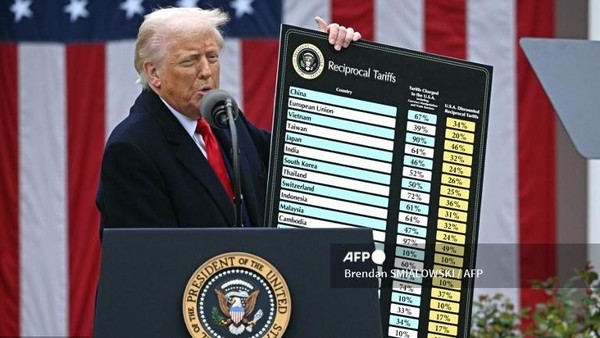New tariffs trigger trade war between USA and China
Tensions escalate in global trade routes
The United States government has again triggered a strong reaction from China after imposing new tariffs on various imported products from the country. This policy was announced as part of the President’s efforts to strengthen domestic industry and reduce dependence on foreign-made goods. However, this decision is considered to be a new trigger for the US-China trade war that has been going on for the past few years. This step has also raised concerns among global market players, who are worried about the domino effect on international economic stability.
The US-China trade war is nothing new. However, with the imposition of new tariffs, tensions between the world’s two largest economies have heated up again. China responded with threats of retaliatory tariffs and reduced imports from strategic sectors from the United States. This step indicates a serious escalation in trade relations between the two countries. The new tariffs have triggered a US-China trade war that has become a hot topic in various world economic forums.
Global market reaction to new tariff policies
The new tariff policies that have triggered a US-China trade war have had a real impact on global markets. The stock market experienced significant fluctuations, with major indices such as the Dow Jones and Nasdaq recording sharp declines. Investors are starting to shift their assets to safer forms of investment, such as gold and government bonds. On the other hand, the manufacturing and export sectors in various countries are starting to be affected due to dependence on the global supply chain involving the two superpowers.
International trade is also experiencing significant pressure. Many countries producing raw materials and electronic components are experiencing a decline in demand due to declining industrial activity in China and the United States. In this context, the new tariffs that triggered the US-China trade war not only have bilateral impacts, but also have broad global effects. Not a few entrepreneurs are complaining about logistical disruptions and increasing production costs.
China’s trade strategy in responding to new tariffs
China did not remain silent in responding to the new tariffs imposed by the United States. The Chinese government announced a series of retaliatory policies, including raising import tariffs on US goods, reducing dependence on American agricultural products, and expanding trade cooperation with other countries. This strategy is a tactical step to reduce the economic pressure that arises from American policies. The new tariffs that triggered the US-China trade war encouraged China to diversify its markets and strengthen economic relations with alternative partners such as ASEAN and the European Union.
In addition, the Chinese government also strengthened domestic incentives for local companies to be more independent in production. Measures such as subsidies, tax cuts, and financing facilities began to be implemented in order to maintain competitiveness in the global market. In this narrative, the trade war became a trigger for structural transformation in China’s industrial sector. Analysts said that the new tariffs that triggered the US and China trade war actually accelerated the technological modernization agenda in the bamboo curtain country.
US domestic policy underlying new tariffs

Behind the tariff policy that triggered the US-China trade war, there are various domestic political and economic considerations in the United States. The government stated that this step is part of a national strategy to protect domestic workers, strengthen the industrial sector, and reduce the trade deficit which has been considered detrimental. The new tariffs mainly target electronics, electric vehicles, and agricultural products which are considered a threat to local businesses.
However, a number of economists have expressed concerns that this policy could backfire. With the increasing price of imported goods, American consumers have the potential to bear a greater burden. Several industry groups have also stated that the new tariffs that triggered the US-China trade war will create uncertainty in the supply chain which has so far been very dependent on components from China. This even has the potential to disrupt medium-term economic growth.
Read Also: Indonesia U17 lost badly in the quarter finals
Implications of tariffs on the technology and manufacturing sectors
One of the sectors most affected by tariff policies is the technology and manufacturing industry. The United States and China have very close trade relations in this area, with production chains that are integrated across countries. New tariffs trigger a trade war between the US and China causing a spike in prices for electronic products and a slowdown in production processes due to the difficulty of accessing key components.
Many technology companies in the United States are starting to consider relocating factories to other countries such as Mexico, Vietnam, or India to avoid high tariffs. However, this relocation is not a short-term solution and requires a lot of investment and time. In the short term, consumers could see a spike in prices for products such as smartphones, laptops, and household appliances. This trade war, in other words, makes it difficult to stabilize prices and supply of technology goods.
The impact of the trade war on the agricultural sector
In addition to the technology sector, the agricultural sector has also been a victim of the new tariffs. China has been one of the main buyers of American agricultural products, including soybeans, corn, and beef. With the imposition of retaliatory tariffs from China, US agricultural exports have fallen drastically. The new tariffs trigger a trade war between the US and China also create uncertainty for farmers who depend on export markets for their livelihoods.
The US government is trying to provide direct assistance to affected farmers, but this assistance is considered insufficient to cover the losses incurred. In this condition, many farmers have to look for alternative markets or even reduce production to adjust to the decreasing demand. Some of them also started to try their luck in other businesses such as local processed products or opening online businesses, including promoting the Situs Slot Cash Crew as a form of income diversification amidst the trade turmoil.
Social and political impacts of prolonged trade wars
New tariffs triggering a trade war between the US and China have also had significant social and political impacts. In the United States, tariff policies have become a hot topic of debate between political parties, especially ahead of the election. Some consider this step as a form of protection for the national economy, while others see it as a policy that does not favor consumers and small businesses.
In China, the government is trying to maintain stability by strengthening economic nationalism and increasing public trust in domestic products. However, pressure from the private sector and industry players is also starting to be felt. In both countries, new tariffs triggering a trade war between the US and China have created new political dynamics that could affect foreign policy and the direction of long-term economic development.
The future of trade relations between the US and China
With the escalation continuing, the future of trade relations between the United States and China is on the line. New tariffs triggering a trade war between the US and China, which is now increasingly complex, require a more serious and open diplomatic approach. Multilateral negotiations and the role of international organizations such as the WTO are expected to ease tensions.
However, in an increasingly competitive global climate, neither the US nor China seems to show any signs of relaxing their respective policies. The tug-of-war of domestic economic and political interests also complicates the path to a resolution. Observers predict that the trade war could turn into a long-term economic conflict if not handled wisely. Thus, the new tariffs that trigger the US and China trade war will continue to be a major highlight in the dynamics of the global economy in the next few years.


